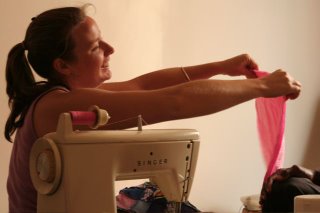Tabaski is the festival of (let me just Google this) Eid Al-Kabir, which celebrates when Abraham offered his son as a sacrifice to God and as a reward had it replaced by a ram. Every family in the country buys a ram and slaughters it on the morning of tabaski, this year, on new year's eve. My downstairs neighbour had tethered her huge great ram to my new rubbish bin, an oil drum which was lovingly turned into a bin for the street by Now in an attempt to educate people in responsible rubbish disposal, and I wasn't best pleased. But letting it pass, I went to the bin to put a piece of rubbish in it. At that moment, the ram looked up from its hay munching and took fright, leaping off down the street with the oil drum still tied to it and all the rubbish all over the road. I could hardly contain my giggles and think it is so far the best tabaski ever. One of the street guardians went off after it and when I last checked, the oil drum was back in its rightful place, but the ram was not. Maybe it has met an early death.

I spent Christmas on this island, my favourite place in the whole world. There are a lot of desert islands in the world, but Carabane is particularly special. A Senegalese person, who I don't know, has a small round house there and three of my friends live and work in it. To suppliment their income they rent out rooms for next to no money, on the arrangement that guests can help if they want to, around the house. It's right on the beach, it's full of animals, and there is a silent peace which is only broken by the wind in the trees and the sound of the waves crashing in the front garden.

This year we had a gang. My friends from Dakar, Cecilia and Jo, plus the three men who live there, Lulu, Pierre and Neba. Because it was Christmas and they are Catholics, they made quite a fuss over it and we all went to midnight mass and then Pierre's sister's house for Christmas lunch. After mass on Christmas eve, we piled out of the palm-decorated church to the large tree behind, where the spirits of the island live. We all stood around in the warm night and drank palm wine from a jug, and poured some out for the spirits too. Afterwards we went to a disco and danced to reggae all night, before walking back across the beach to our home. Christmas day involved chicken, couscous and beer, and then a trip to the middle of the football pitch to pick up the island's only phone reception to speak to people in England.

We had wonderful food all week, lots of fresh fish, a sea snail the size of my head (which was saw caught and killed but refused to eat), rum and lemon cocktails. It was almost too perfect, too beautiful. Wednesday morning brought with it the boatman, who came to take us back to Ziguinchor. We felt miserable to leave, and worse as the day wore on. By the time we arrived at the house, all I could do was lock myself away in the bathroom and enjoy running water, even if cold. Thursday morning we got back on the ferry to go back to Dakar, and all waited earnestly for the moment when the ferry passes the island. we knew we wouldn't be able to see much, but I think we all hoped that there would be a signal from shore to let us know that paradise hadn't forgotten us.
"I rather imagined that the boys would be on the beach waving a flag for us," said Jo, visibly disappointed.
Suddenly Cecilia screamed: she had seen a flash of white. Sure enough, there on the beach outside the house, was someone waving something white, a speck in the distance but enough to make me feel buoyant and revived. We pulled off our scarves and waved back, and everything felt better.
Arriving in Dakar, I discovered that not only is there a gas shortage in Dakar, but that my gas bottle had run out. Half way through my carrot soup, I had to go out and lug my gas bottle around the tiny shops in the neighbourhood looking for gas. To soften the blow of telling me there was no gas in the entire city, each shop owner simply told me I could get it at the next shop. I understand it was an act of kindness, but it meant by the time I had given up and flagged down a taxi, I was exhausted and my arms hurt. But I fell upon luck. The taxi man, a young guy in a red fez, drove by and said,
"Oh, Lady, you look so tired. Get in, and just give me what money you want."
He drove me from shop to shop, swerving across the road and pulling up outside every time he saw one.
"Hssssssss!", he called out. "Any gas in your shop?" he asked, before driving on. Finally we found some, in the gas depot of course, and he took me home.
Happy new year to you all. May your 2007 dreams come true.

